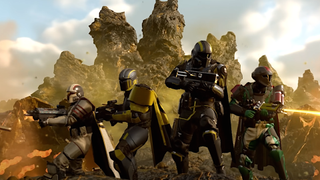Helldivers 2 CEO talks DLSS and FSR: 'When you are in a prio meeting and it's more awesome content vs more tech the decision is easy…'
You can't please all people, all of the time, but that never stops people from complaining.

Helldivers 2 is probably been the biggest surprise hit of 2024 so far but not everyone has been happy with it. A response by Arrowhead's CEO Johan Pilestedt, to criticism over the lack of the option to use DLSS/FSR upscaling, was first interpreted as meaning that it wouldn't be implemented at all. Pilesedt quickly shot that notion right down, simply replying that "gameplay > cool tech".
All of these shenanigans took place over at X, of course, with it all starting with one run-of-the-mill spot of negative criticism. That particular person appears to believe that upscalers, such as like DLSS and FSR, are "basic features" in today's PC games, but Pilestedt responded by calling it "cool tech but not necessary" before going on to expand that he'd prefer to use the coding time required to improve the game's fundamental gameplay.
Naturally, that was completely misconstrued to imply that Helldivers 2 was never going to get DLSS. Cue yet another reply from Pilestedt to shoot that idea out of the sky.
Helldivers 2 isn't an especially graphically-demanding game, compared to the likes of Alan Wake 2. The PC hardware requirements are very modest and it will run perfectly fine on systems that are quite a few years old or even mid-range gaming laptops, as used to test it in our review. In short, the game doesn't specifically need upscaling.
Pilestedt, who is the CEO and Creative Director at Arrowhead, the developer of Helldivers 2, explained why. It partly comes down to the fact that the game is mostly CPU-limited, as the engine "simulate(s) everything." But more importantly, it was about prioritising the tasks for the programmers to focus on, saying "I love DLSS and other performance boosting tech. But when you are in a prio meeting and it's 'more awesome content' vs 'more tech' the decision is easy..."
That's not what I said! 😂I only said "gameplay > cool tech".February 25, 2024
I like upscaling and frame generation: To me, they're incredibly useful tools for boosting a game's performance without losing too much visual quality. However, if a game runs perfectly well without them being enabled, I never use them. I'm not someone who wants hundreds of frames per second in my games. No issue with anybody who does, but it's just not important to me.

Best gaming PC: The top pre-built machines.
Best gaming laptop: Great devices for mobile gaming.
So I get exactly where Pilestedt is coming from with his comments and I'll go one step further: Give me gameplay and cool content over graphics any day of the week. Before I'm labelled as being a miserable old goat who constantly harks back to the 16-bit era, I'm very much a fan of modern graphics. I spend a fair amount of my free time messing about with Unreal Engine 5 and ray tracing.
The biggest gaming news, reviews and hardware deals
Keep up to date with the most important stories and the best deals, as picked by the PC Gamer team.
Helldivers 2's graphics are perfectly acceptable as they are and it fits the overall vibe of the game brilliantly. And because they're not bogged down with ray tracing or billions of compute shaders, you just don't need upscaling if you have a reasonable enough graphics card. I guess for some people, the option would be really handy to have, but developers have to allocate their time properly.
And in the case of Helldivers 2, the gameplay you get is way better than any cool upscaling tech.

Nick, gaming, and computers all first met in 1981, with the love affair starting on a Sinclair ZX81 in kit form and a book on ZX Basic. He ended up becoming a physics and IT teacher, but by the late 1990s decided it was time to cut his teeth writing for a long defunct UK tech site. He went on to do the same at Madonion, helping to write the help files for 3DMark and PCMark. After a short stint working at Beyond3D.com, Nick joined Futuremark (MadOnion rebranded) full-time, as editor-in-chief for its gaming and hardware section, YouGamers. After the site shutdown, he became an engineering and computing lecturer for many years, but missed the writing bug. Cue four years at TechSpot.com and over 100 long articles on anything and everything. He freely admits to being far too obsessed with GPUs and open world grindy RPGs, but who isn't these days?
Most Popular






